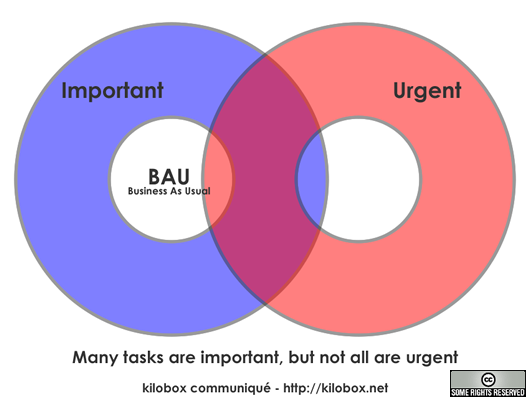In the busy worlds of publishing, communications, PR, media, internal comms and business, there are many time constraints and pressures. People want things done, and done now.
If you’re a ‘gate-keeper’, like a web publisher or editor, you’ll know how it feels when people tell you “this is urgent” or “we’re behind schedule, I need this done now”.
Other people’s slipped deadlines mean that they’re expecting us to drop everything and focus on their demands to bail them out of their poor time management problems.
Lots of things are important. Why would we spend time, money and resources on something that wasn’t? The trouble is, people can’t see the overall picture when they’re flapping around, worrying about their broken promises and deadlines. They confuse important with urgent.
Lots of things are important, but they’re not always urgent. The originator’s failure to keep to their deadline doesn’t mean their project is suddenly urgent for the rest of the company. Lots of things are urgent – who’s to say what the priority is with all these urgent and important matters? There are only so many hours in the day; resources are limited – always.

Important and Urgent Venn Diagram by Wedge – kilobox is licensed under a Creative Commons Attribution 2.0 UK: England & Wales License.
Permissions beyond the scope of this license may be available at http://kilobox.net/about/contact/.
Let’s be clear in our meaning; important and urgent are not synonyms – they have distinct definitions and while some tasks can be both important and urgent (as shown above in my basic Venn diagram) many tasks are not nearly as urgent as their owners believe them to be.
How do you differentiate between important matters, and urgent matters? How do you explain to task owners their assumption that their task is urgent for everyone is skewed and self-centred? How do you delay important matters when truly urgent tasks crop up?
[Wedge]





Great post Wedge, the graphic I found particularly useful.
Important tasks I either star the email for following up and put it in a Follow Up 24 folder (to be followed up with the day, same with 48 and 72) or write it down and highlight which is essentially telling me bloody do this or you’re an idiot.
Urgent tasks I write a post it note and stick them round my TFT screen, as I speak I have 4 of them shouting out at me to love and caress them before discarding them in the bin without a care in the world.
For me, it’s all about prioritising. Urgent comes first, Important second. Important is still important and may well be urgent in it’s own way so it’s subjective and really up to you what you deem to be the difference. What’s important to you may be urgent to someone else!
Thoughts?
Nice of you to appreciate my graphic – it’s obviously pretty banal but hey, I felt like illustrating my point :)
Post-its, def use those, yep yep.
I’m learning that there’s nothing much that’s urgent, and not a great deal that’s actually important.
Great diagram, but I would ask whether it’s possible to have something that’s *just* urgent. If something’s not important, can it possibly be urgent?
Certainly that’s a question to ponder.
I might suggest that something along the lines of a ‘nice to have’ story that is ‘of the moment’ might be urgent, but not important.
E.g. A gazillion blogs wrote about the US Elections today; it was ‘urgent’ because there was a real need to react immediately to the breaking news, however, for the majority of websites it can’t have been important. With every news agency in the world mentioning Mr. Obama, how ‘important’ was it for your favourite knitting blog to ‘report’ the result?
Ah, yes I see what you mean, thank you.
I read somewhere about things ‘seeming’ to be important or urgent at the time, but if you looked back on them a year from now they wouldn’t seem half as important and you’d wonder why you worried so much.
Hmmm. I love it when you make me think. And time management is one of my favorite topics. Seriously. I’m a geek like that.
I basically do this:
http://www.time-management-basics.com/images/top/Slide13.GIF
… but in my head. (Sorry, can’t post the graphic here.)
I find the key thing is to not let other people infect me with their false sense of urgency. As I like to say, “A panic on your part does not constitute and emergency on mine.”
Being ever-so-slightly OCD in nature – and because I’m constantly managing several long-term projects at the same time – I also like to use Gantt Charts and Task Lists with benchmark deadlines to keep me on track.
The upside is: I’ve never missed a final deadline for a project.
The down side is this: I’m such a perfectionist, I sometimes spend waaaaay too much time obsessing over getting the *planning* juuuuust right. Ironically, this round-about procrastination leads, of course, to increased urgency for the actual *project*. Whoops.
Hi, I’m Candace, and I’m a tinker:
http://www.douglasjohnston.net/weblog/archives/2006/01/04/tinkertailor/
Oh, I’ve also been known to give certain contributers false early deadlines to ensure that I will have their work by the time I actually need it.
Honest? No.
Effective? Yes.